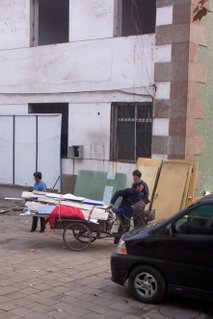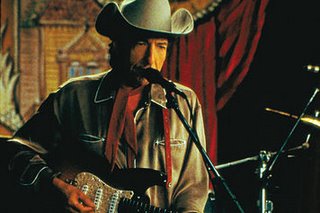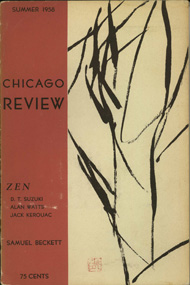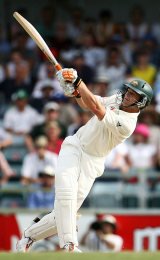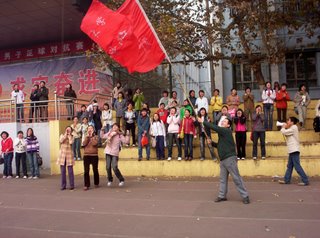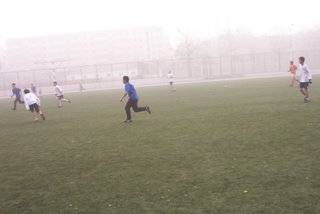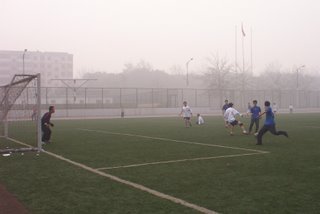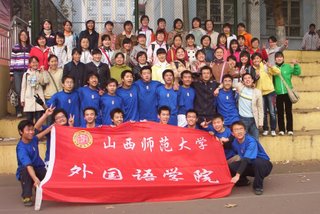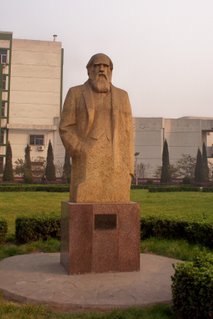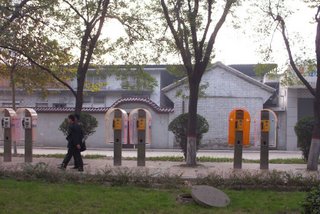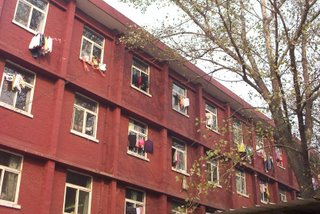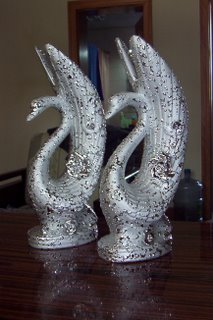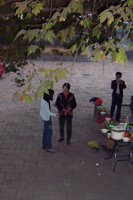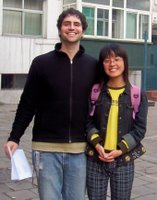
We had such a beautiful night tonight I must tell you about it.
Some three months ago we started a 'cultural evening' called
Open Mouth here at
Shanxi Normal University, compered and drawn together by
Shabnam and others. The first night went well, with a capella singing, story telling and poetry. But the second month went a little flat as a lot of the people were away or ill with a virus which was doing the rounds, particularly with the 'foreigners' here.
Tonight was a Phoenix rising out of the ashes!
Mainly because one guy here,
Tom, encouraged some members of the music department to come and play traditonal Chinese instruments - this made it a truly cultural exchange night. Very beautiful music from stringed instruments
pipa and
erhu and a flute which I don't know the name of. I will research all the performers names in the next coluple of days, but for now go to
http://www.liufangmusic.net/samples/mp3/liufang1-05.mp3 for a wonderful version of similar music.
Here are some definitions:
Pipa (pi-pa or p'i-p'a) - four-stringed lute with 30 frets and pear-shaped body. The instrumentalist holds the pipa upright and play with five small plectra attached to each finger of the right hand. The pipa history can be dated back at least 2000 years and developed from pentatonic to full scales. This instrument has extremely wide dynamic range and remarkable expressive power.
Erhu - or Er-Hu, a two-stringed fiddle, is one of the most popular Chinese instruments in the Hu-qin family, where Hu stands for "foreign" or "the northern folk" in Chinese, and "qin" is a general name for all kinds of string instruments.
After an amazing flute music number first,
Tom read two poems centred on the experience of student life on the campus.
Javard, young American English teacher, then introduced his item with a potted history of hip-hop and/or rap music. Chinese uni student
Daisy (her English name) translated for the many Chinese people in the crowd. Javard then launched into a very fast rendition of his own rap number. Amazing rhymes and rhythms!
Jeff, American living in China for some years (and father of Sophie known to many readers of this blog) then sang a number - from
Little Feat. All about a Dixie chicken and Tennesee lamb ... or somesuch :-) This is a PoMo age, folks, where culture (Kulchur to Pound) is full of diversity.
Jamie, American singer of songs and a self-confessed Rebel (did I get that right?), got up next to sing... a Chinese pop song taught to him by his students. A brave man ... Then there was a beautiful rendition of a song on
erhu by an equally beautiful Chinese young musician. This traditional music was followed by a young Chinese male student called
Jack (English name) who sang a Chinese song about 'reunion', or 'unification'. This was followed by two young ladies playing
pipa - a duet of amazing emotional depth and excitement. I then read a couple of recent poems about
Manhole Covers and
Teaching English History here in Linfen. Another young Chinese lady from the music department then played a
pipa item of much spirit and drive.
The evening was concluded by
John Jain, patriarch of the local clan, who recited a Robert Service ballad, entitled something like
'The Cremation of Sam McGee'Ahh, a fun night in Linfen where the weather is getting cold but the hospitality hots up.
Next month's 'Open Mouth' evening is going to be held at
8pm at the Science Building, Room 802, Shanxi Normal University, on Saturday 9th December. All peoples of the province are invited to star and listen.


